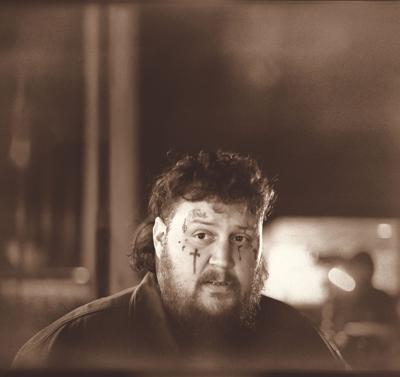
Friday night, Antioch’s own Jelly Roll — who has a knack for effortlessly navigating between country music, hip-hop and rock as well as the spaces between — headlines Bridgestone Arena as a genuine hitmaker. He’s got the nine-digit streaming numbers, airplay and Opry appearances to be an all-caps COUNTRY STAR. But to us, he’ll always be a hometown kid hustling mixtapes (à la the classic Whiskey Weed & Waffle House that helped him gain recognition far outside Nashville).
Jelly Roll is a soulful singer and rapper who repped Nashville so hard that Music Row couldn’t ignore him. He’s a gifted storyteller with as many fist-pumping bangers in his catalog as tear-jerking ballads — his just-released single “She” being one of the latter — a grand example of the Saturday night/Sunday morning dichotomy at the heart of this city’s creative soul. The Scene caught up with him by phone as he prepared for his guest-packed, sold-out show.
Let’s take it all the way back: Where did you see your first show?
I went to my first show at the Starwood Amphitheater in, I think, ’96 or ’97. No Doubt and 311 played the same year that Lollapalooza came to town. I was a teenage kid, and I got dropped off with my friends and my older sister at both of them, and I’ll never forget it, baby. Starwood Amphitheater, baby. I’m talking about mud-sliding down the hill while Gwen Stefani’s playing “Spiderwebs.” … I’m a 13-year-old boy singing, “I’m just a girl!”
Where did you play your first Nashville show?
The Playing Field on Antioch Pike. I drove by the other day to look at it and kind of tell the story on camera — now it’s closed. My second big show in Nashville — do you remember the strip club they called The Church? It was right there by the interstate in downtown Nashville, almost by Jo Johnston on Charlotte. So the upstairs was a strip club, and then downstairs, a little bitty bar. We played a show there. This is back when Jo Johnston was still the projects. It hadn’t been torn down yet.
What do you think has changed the most about music in the city since you were playing shows like that one?
Because of streaming, local people aren’t as [easily] found. Because when I was coming up, you met the local people because they were pushing their CDs. You remember that big Nashville Scene piece y’all did on the cover that had All Star — back when Starlito went by All Star — and it was talking about the Grind Hard movement? Him having the cover of the Nashville Scene was such a big deal for Nashville hip-hop in that moment. It showed the impact that All Star was having with selling his mixtapes and T-shirts out of a trunk, that he was taking over every corner of Nashville. … The whole scene here was just so far ahead of its time.
Do you remember where you sold your first tape?
I’m trying to remember if it was at the Mapco at Priest Lake, or if it was at school. But I would guess it was probably at school. Because I would take a spindle of CDs even to the eighth grade in Cameron Middle School, where I’d cut a one-track demo and printed 30 CDs myself on the one CD burner we had at the house. Took me all night. Wrote on each one of them the name of the song, and then went to school and got everybody’s breakfast money for the 30 of them.
Where were you recording early on when you were younger?
Man, I was lucky. I had a friend named Bobby with a group, a rap group called Top Dollar, and they had found a studio in Antioch called Switchyard. For $25 an hour, Switchyard would let you sing your raps into their microphone, and they would give you what I now know to be a desk print of the song. Just a console print, just, “OK, that’s what you did,” print the song, and they’d give you a CD.
When I’m telling the story, I’m like, “I don’t think y’all get it. You wasn’t there.” You would’ve had to have seen it. You’d have had to have remembered when All Star got the cover of Nashville Scene. You’d have had to have remembered Platinum Bound mixtape shop having a line down Jefferson Street every Tuesday waiting on a record. You know what I mean? Or New Life in West Nashville had a line wrapped around the building twice, waiting on a record. Lil Les’ mixtape shop in Antioch. I remember all these mom-and-pop stores that we would consign our CDs to. Cat’s Music in East Nashville. Tower Records.
How many songs do you think you’ve written over the years?
Well over 1,500. If I had to guess, I’m edging on 2,000 … and what’s crazy? The growth of the music … the man grew first. That’s the way I explain it: that Jason DeFord, the man, grew. And as he grew, the content that Jelly Roll was willing to sing about changed. I was a mad, angry rapper — independent kid. I was pissed off. I always had a point to prove, and tried to battle people, and felt overlooked. And then you get older and you’re like, “Ah, I just got to have patience. I’m doing the right thing. I’m staying the course.” Everything changed. My heart changed. I had a kid. You get soft and you start writing love songs or sad songs. … You know what I mean? Things just change.





